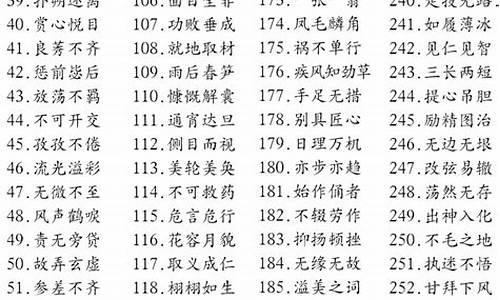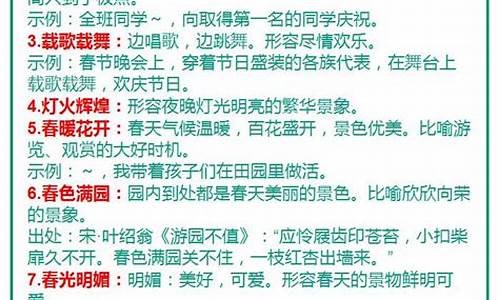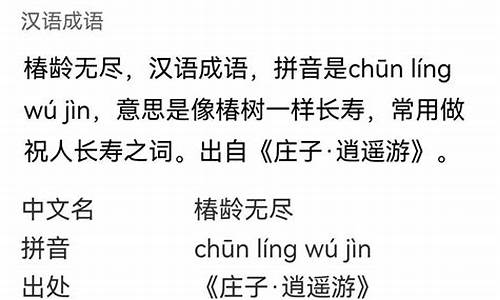您现在的位置是: 首页 > 在线成语解释 在线成语解释
dictatorial_dictatorial词根
tamoadmin 2024-07-09 人已围观
简介1.托福写作话题分析之女性2.dict或dic开头的单词3.霸道用英语怎么说 形容词哦4.政权的单词政权的单词是什么5.求翻译英文 罗马内战6.高中文言文实词 定,独,笃,度,断,夺的解释 例句 出处 词性 要详细!!!7.利用词缀词根背单词1. 请帮忙完成一个英文故事写出一个不少于50字的英文故事,其中故事的 Long long ago,there was a beautiful isla
1.托福写作话题分析之女性
2.dict或dic开头的单词
3.霸道用英语怎么说 形容词哦
4.政权的单词政权的单词是什么
5.求翻译英文 罗马内战
6.高中文言文实词 定,独,笃,度,断,夺的解释 例句 出处 词性 要详细!!!
7.利用词缀词根背单词

1. 请帮忙完成一个英文故事写出一个不少于50字的英文故事,其中故事的
Long long ago,there was a beautiful island country located on a sheet of the vast sea.Unfortunat-ely,the head of the island country was a bad king.The king was extremely dictatorial and brutal.Once there was one who was disobedient to him,then the king would punish him severely.But everyone knows the king had a very lovely and virtuous daughter,Sarah Princess,who always helped the helpless people of the country.One day,the princess met a handsome warrior during the process of helping the homeless and lonely people.The warrior was as warm-hearted as the princess,and he was looking after an injured child at that time .Since the occasional meeting,the princess often met with the warrior and chatted happily with each other and helped the poor and frail people together.Soon they fell in love with each other.Meanwhile,It was high time that the princess should get married.So the king arranged the intermarriage for her.Undoubtedly,the princess wouldn't obey the king's mand.Later the king found out the reason why Sarah didn't listen to him which is because of the warrior.Thus,the king was rather furious,and ordered his personal attendant dug the warrior's eyes.Then the warrior bee a blind man,but for all that the princess still loved the warrior very much.This beautiful and poignant love story came down the ages and moved countless people deeply.。
2. 英文故事和英文作文的格式怎么写1. 英文作文格式说明:
Title (标题):写英文作文时,若有标题之要求时,我们就必须书写题目;若无要求则无需书写题目。
Indent (缩排):英文作文每段开头均须往内空4-5个英文字母。开头英文字母要大写。英文作文每段左方之每一行均须切齐,右方则否,保持「之字形」(zigzag)。
Punctuations (标点符号):任何标点符号皆不可以至於英文句子的开头。常用英文标点符号分类如下:
. 句号 period
逗号 ma
; 分号 semicolon
: 冒号 colon
问号 question mark
! 惊叹号 exclamation point
“ ” 双引号 double quotation mark
' ' 单引号 single quotation mark
– 连字号 hyphen
–– 破折号 dash
( ) 括号 parenthesis
[ ] 方括号 square bracket
. . . 删节号 ellipsis
2. 段落结构
Introduction (导论):文章的引言,吸引读者,阐明文意,导入正题。英文作文的引言必须包含Thesis Statement (论点),是整篇文章的灵魂所在。Thesis Statement常是在引言导论的最后一句。它就像是罗盘一般,有两个主要功能:告诉读著作者的想法思路;作者以它为指引,以免自己写偏。
Body (内文):把论点加以细项分类,并支持论点,深入讨论。Body 必须包含Topic Sentence (主题句)。一般说来,主题句必须置於每一个Supporting Paragraph(支持段落)开始的第一句。主题句的用意在於说明整个段落的大意,是段落的摘要,也是段落内容的基础。简言之,Thesis Statement之於整篇文章的重要性,犹如Supporting Paragraph之於Body。
Conclusion (结论):总结文章,重申论点。可再简述文章要点,有时可提出引人省思的问题,但不宜再发展其它论点。
Order (次序):次序指的是文章内容在文章中的组织、安排、或是组成序列。常用次序如下:
1. Chronological Order / Time Order (时间次序):故事的发展需以时间为基础,按时间的推移来发展。以事件或人物出现的先后次序来展开故事。
2. Spatial Order (空间次序):作者根据空间的细节所做描述顺序之安排。以一个物理位置为基础,作者描述了可从该一位置所看到的景象、物体。描述顺序有其联贯性。ㄧ般由左到右,从前到后,或从上到下。
3. Ascending Order / Emphatic Order (递增顺序):递增顺序有时被称为「把最重要的留到最后」。这个方法把重点,也就是把文章最有趣、或重要的细节,放置在文章的最后一个支持的段落。最后的位置在一篇文章中,往往是最有力的位置。因为读者最有可能记得最后提及的事情。最典型的用语有 “last of all,” “the most important reason, part. . . ”等。
4. Descending Order (递减顺序):相对於递增顺序,递减顺序把重点摆在文章的第一个支持论点的段落。也就是把文章最有趣、或重要的细节,放置在文章的开端。作者当然认为其他的论点也是重要的,只是他先提及相对而言最重要的部分。
3. 26个英文字母的故事作文26个英文字母的故事在一所英文房子里,住着26个好朋友,它们就是26个英文字母:A、B、C、D、E、F、G、H、I、J、K、L、M、N、O、P、Q、R、S、T、U、V、W、X、Y、Z。
A是它们的老大,,他最擅长体育,因为他有两条长长的腿;B长的胖胖的,朋友们都叫他“小猪B”;C喜欢唱歌,“F4”是她的偶像;D比“小猪B”还贪吃,是贪吃大王;E是小小音乐家,他会拉小提琴;……总之,26个英文字母各自有各自的爱好与特长。O是家里的小厨师。
这天,O像往常一样,第一个起床。她来到厨房,准备为伙伴们做早餐,可是她看见餐桌上放着一些山珍海味的剩菜,想起每天晚上为了第二天能早起床给大家做早饭,她很早就谁下了。
O恍然大悟,原来伙伴们晚上偷偷的吃好吃的。这时,其它的25个英文字母也都起来了,他们看见O在厨房里呆呆地站着,正想跟她解释。
O一气之下冲出了家去,她猜想,伙伴们一定会出来找她,然后把她请回去。可是25个英文字母并没有出来找她,而是在家忙碌着。
这可把O给气坏了,她要看看,他们晚上到底要干什么。夜幕降临了,天空中群星闪烁。
O来到窗户下,她看见了意想不到的情景:25个英文字母正在喂10只小猫吃鱼。原来,这10只小猫是H在买菜回来的时候发现的,好像是走丢了的,H看它们可怜,就把它们带回家来。
大家都知道O最怕猫,她连狮子、蛇都不怕,可她就是怕猫,所以大家伙等O睡下后,就开始喂猫了。原来这一切,都是O误会他们了。
O走了进去,她低着头,向伙伴们道歉:“对不起,是我错怪你们了。”A走过来,拍着她的肩膀说:“没关系,我们已经原谅你了。”
这时,从A身后突然蹦出一只小猫。“啊”一声尖叫,O又一次冲出门去,大家哈哈大笑起来。
从此以后,26个英文字母又成了形影不离的好朋友了。
托福写作话题分析之女性
Chinese revolutionary leader. He founded the Hsin Chung Hui (‘New China Party’) in 1894, one of the political groups that merged to form the Kuomintang (Guomindang, nationalist party) in 1912 after the overthrow of the Manchu Empire. He was elected provisional president of the Republic of China in December 1911 and played a vital part in deposing the emperor, who abdicated in February 1912. He was president of a breakaway from 1921.
After many years in exile he returned to China during the 1911 revolution that overthrew the Manchu dynasty. In an effort to bring unity to China, he resigned as provisional president in 1912 in favour of the military leader Yuan Shikai. As a result of Yuan's increasingly dictatorial methods, Sun established an independent republic in southern China based in Canton in 1921. He was criticized for lack of organizational ability, but his ‘three people's principles’ of nationalism, democracy, and social reform are accepted by both the nationalists and the Chinese communists.
Between 1916 and Sun's death in 1925, his southern-based nationalist regime contended for supremacy with northern-based warlords and from the early 1920s received support from the Soviet Union and the new Chinese Communist Party (CCP). He failed in his goal of securing national reunification, which was left to be achieved, briefly, by his successor, Jiang Jie Shi (Chiang Kai-shek).
dict或dic开头的单词
有输入才会有输出,要想写出高分的托福 作文 ,我们也要多多参考别人的优秀 范文 ,下面我给大家带来托福写作话题分析之女性,望喜欢1
托福写作真题范文:时装为女性创作
‘New fashions in clothing are created solely
for the commercial exploitation of women’
Whenever you see an old film, even one made as little as ten years ago, you cannot help being struck by the appearance of the women taking part. Their hair-styles and make-up look dated; their skirts look either too long or too short; their general appearance is, in face, slightly ludicrous. The men taking part in the film, on the other hand, are clearly recognizable. There is nothing about their appearance to suggest that they belong to an entirely different age.
This illusion is created by changing fashions. Over the years the great majority of men have successfully resisted all attempts to make them change their style of dress. The same cannot be said for women. Each year a few so-called ‘ top designers’ in Paris or Longdon lay down the lawy and women the whole world over rush to obey. The decrees of the designers are unpredictable and dictatorial. This year, they decide in their arbitrary fashion, skirts will be short and waists will be hight; zips are in and buttons are out. Next year the law is reversed and far from taking exception, no one is even mildly surprised.
If women are mercilessly exploited year after year, they have only themselves to blame. Because they shudder at the thought of being seen in public in clothes that are out of fashion, they are annually blackmailed by the designers and the big stores. Clothes which have been worn only a few times have to be discarded because of the dictates of fashion. When you come to think of it, only a woman is capable of standing in front of a wardrobe packed full of clothes and announcing sadly that she has nothing to wear.
Changing fashions are nothing more than the deliberate creation of waste. Mayb women squander vast sums of money each year to replace clothes that have hardly been worn. Women who can not afford to discard clothing in this way, waste hours of their time altering the dresses they have. Hem-lines are taken up or let down; waist-lines are taken in or let out; neck-lines are lowered or raised, and so on.
No one can claim that the fashion industry contributes anything really important to society. Fashion designers are really important to society. Fashion designers are rarelyconcerned with vital things like warmth, comfort and durability. They are only interested in outward appearance and they take advantage of the face that women will put up with any amount of discomfort, providing they look right. There can hardly be a man who hasn’t at some time in his life smiled at the sight of a woman shivering in a flimsy dress on a wintry day, or delicately picking her way through deep snow in dainty shoes.
When comparing men and women in the matter of fashion, the conclusions to be drawn are obvious. Do the constantly changing fashions of women’s clothes, one wonders, reflect basic qualities of fickleness and instability? Men are too sensible to let themselves be bullied by fashion designers. Do their unchanging styles of dress reflect basic qualities of stability and reliability? That is for you decide.
托福写作素材:为什么女性比男性更适合做司机
It appears that only one thing has prevented women being declared better drivers than men – their modesty.
在宣布女性比男性更适合做司机这件事上,好像只有一件事成了阻碍——那就是女性太谦虚了。
A study has found that women really are more proficient behind the wheel – they just lack the confidence to say it.
一项研究发现,在驾驶方面女性比男性更精通——但是她们却没信心说出来。
When put through their paces, women motorists comfortably beat men in a series of driving tests.
经过一系列的驾驶测试发现,在驾驶方面,女性司机很轻松地就赢过了男性司机。
In the tests, men and women conformed to gender stereotypes – with men more likely to take risks, drive too close to the car in front, cut corners, go through lights on amber or talk at the wheel.
在测试中,女性和男性司机都非常符合本性别的角色定型——男司机更喜欢冒险、与前面车辆相距过近、抄近路、闯黄灯或驾驶时说话或打电话。
By contrast, women are more likely to be courteous and considerate, take care when approaching potential hazards, use their mirrors correctly and stop at lights when they turn amber.
相比之下,女司机表现的则更有礼貌和体贴,在接近潜在危险时更加小心谨慎,正确应用她们的反光镜,黄灯亮时会停止行驶。
The study by Privilege Insurance concluded: ‘After years of debate and banter comes the news that will have men running for cover. It is now official: women are actually better drivers than men.'
优惠 保险 (Privilege Insurance)根据调查 总结 道:“多年的争论后得出的结论让男性无地自容,因为现在官方承认:与男司机相比,女司机是更好的司机。
The tests were supplemented by a driver-attitude poll of 1,383 motorists, which found that fewer than a third of women (28 per cent) believed they were better drivers than men. By contrast, only one in eight men (13 per cent) thought women were superior behind the wheel.
另外一项对1383名驾驶员的驾驶态度调查也补充证实了上述测试结果。在这项调查中发现,不到三分之一(28%)的女性相信她们自己比男性更适合当司机。而仅仅八分之一(13%)的男性认为女性在驾驶方面比他们更精通。
Vocabulary
motorist 驾驶员
gender stereotype 性别角色定型
amber **
托福词汇中的女性称呼
a plain Jane 不起眼的女人
clinging vine 会撒娇的女子;依赖男子的女人
skirt 青年女子
doll 美人
one's old lady 老娘,某人的母亲
one's ball and chain 老婆
the little woman 老婆,太太
spring chicken 少女
old hen 老婆子
托福口语中形容女性的句型:
1. Hey, look at the chick over there.
看看在那边的女孩.Chick 这个字代表的就是女孩子, 各位不要跟 chic (时尚) 这个字给搞混了. Chick 这个字念起来就像是 chicken 前面的几个音, 所以蛮好认的. 一般而言 chick 和 girl 是可以交互使用的, 例如, 她是个十三岁的女孩, 就是 She is a thirteen-year-old chick.
2. She is gorgeous!
她真是漂亮.
要懂得适时地称赞女孩实在是每个男士必修的功课. 一句简单的 You are pretty! 或是 You are so beautiful 就可以让人家高兴上好半天. Gorgeous 和 pretty, beautiful 都是美丽的意思, 但是程度上可能要比 pretty 和 beautiful 还要再来的高一些. 所以下次再看到美女, 别忘了说一声, You are gorgeous! 说不定她就变成你的老婆了.
3. She is a babe.
她是个美女.这句话是用来形容美女的喔. 像是我今天去打球看到一个很美很美的女孩, 那我就会跟我的同学说, She is really a babe. 要特别注意 babe 跟 baby 只有一字之差但却相差十万八钎里. 你钎万不要说成 Oh! I like the baby, 那么你很有可能被人家当成恋童癖.
4. She turns me on.
她让我眼睛为之一亮.
各位男生不知有没有这样的 经验 , 一位长发美女从你眼前走过, 你的目光便不自觉地投射在她身上, 全身的血液也开始跟著沸腾起来. 这要怎么用英文形容呢? 这就叫 She turns me on. 这好像是说, 她把你身上的电源都给打开了.
另外, turn-on 也可以当作名词用, 它用来表示任何令你觉得很不错的人, 事, 物. 另外你可以说 She is such a turn-on. 就是说她给我的感觉还蛮不错的.
托福写作提分注意7种托福写作常用的过渡词
1)时间
表示时间的过渡词能用到以下表达:before, after, ago, later, then, next, at the same time, while,meanwhile, since, during.
EXAMPLE
As China has witnessed its dramatic transformation in economy since1978, people’s life has been altered a lot compared with decades of years ago.During the past years, people’s eating habits have also been different. With more choicesemerging, there are more kinds of food available; at the same time, theprocessed technology makes it possible to preserve the nutrients of food asmuch as possible.
2) 因果关系
表示一个事物引起另一个事物的过渡词能用到以下表达:because, because of, since, on account of, due to, owing to, so, therefore,thereby, hence, thereby, thus, as a result, result in, as a consequence,consequently.
EXAMPLE
Meanwhile, in some rich countries and areas where education ishighly developed, there are other factors which may hind a country’sdevelopment, such as environmental pollution. Beijing, for example, as China’s educationcenter, has seen its people suffering from heavy smog since several years ago.With the rapid development of this metropolis, the air quality is getting worseand worse. People get sick and some of them even die. More and more companiesand workers are leaving this city because of the unaffordable health cost,resulting in huge economic damage. In this case, it is air quality that acts asthe most key part in social development instead of education. Thus the mosturgent task for the is to improve the air quality other thanimproving schools.
3) 并列关系
在写作中表示并列关系可用以下表达:First…Second…Third….Also, as well as, and, similarly,besides,On one hand…one theother hand…
EXAMPLE
In contrast, to protect the environment and develop farming, the should encourage farmers to compost animal waste for use as anatural soil amendment and reduce the use of pesticides that contain hazardouselements so as to ensure food security as well as food safety.
4) 递进关系:
为了在 文章 中表示递进关系,可以采用以下表达:Moreover, furthermore, in addition, what’s more,besides, also, similarly
EXAMPLE
What we should not ignore is the advantages owned by small partiesthat cannot be replaced by big parties. Compared with small parties, bigparties cost much more money and not all the food and drinks can be eaten up,as a result of which would cause much more waste; besides, there are much morepeople in the big parties and it is hard to know about all of them, among whichthe strangers can cause alienation and loneliness; in addition, unlike smallparties, big parties are hard to organize because it is really difficult tomake a schedule which is available to all the participants. Thus, it is easier,more economical, and more convenient to have small parties rather than bigparties.
5) 让步转折关系
在文章中表示让步转折的关系,可以采用以下表达:Although, though, despite, in spite of
EXAMPLE
Though we can see the importance of communication skills, it is hardfor us to agree with the arguer since there are many other important aspectsfor a person’s success which are left out.
6) 比较关系:
为了在写作中体现比较关系,可以采用一下表达:Compare with, in comparison with, in contrast to, similar to,similarly, like, unlike, either/or, Correspondently, resemble, almost the sameas, at the same time as, just as, in a like manner, in the same way, common in,than, also, neither/nor, differ from, while yet, instead
EXAMPLE
By contrast, it is needful for the to put more money inenhancing the economy of the impoverished areas. A small village in my hometowncan be evident. Compared with the city’s prosperity, thisvillage is almost cut off from civilization, where people lead an extremelypoor life: their food is only potatoes; their clothes are dirty and worn-out;their houses are dilapidated, made of woods and stones; there is almost no busthat can reach there since the road is bad.
7) 解释说明
通过举例说明某一观点时可用一下表达:In other words, to clarify, to explain, to paraphrase, as, like,that is, for example, such as, for instance, to illustrate, namely
EXAMPLE
Working is a lifelong thing. If money has been put the first, it canbe wrong. I will give an example in order to explain my viewpoint. Manywhite-collar workers in big cities always work overtime in order to earn moremoney. But working overtime has eroded their relaxing time and damaged theirhealth and family relationship. Later, they have to pay a high price to fixtheir health problems and their unhappy family life. Moreover, some unluckystaff even died from overwork.
霸道用英语怎么说 形容词哦
可以查到如下单词
dicta dictate
dictated dictates
dictating dictation
dictations dictator
dictatorial dictatorially
dictators dictatorship
dictatorships diction
dictionaries dictionary
dictum dictums
政权的单词政权的单词是什么
霸道 [bà dào]
overbearing potent high-handed (of liquor, medicine, etc.) strong (feudal) rule by force
相关解释:
arbitrariness
Angleton was an autocratic man.
安格尔顿是个专横霸道的人。
-- 英汉 - 辞典例句
She deeply hated ugliness or intrusion or arrogance.
她对邪恶、霸道和傲慢深恶痛绝。
-- 英汉 - 辞典例句
As the chain mushroomed in the 1970s, complaints of monopolistic arrogance threatened Gannett's image.
七十年代甘尼特报系蓬勃发展起来时,对垄断这种霸道的不满威胁到甘尼特的形象。
-- 英汉 - 辞典例句
He lords it over his household.
他在家里专横霸道。
-- 英汉 - 辞典例句
I imagine methods will be a little less drastic.
我相信我们的手段还不至于那样霸道。
-- 英汉 - 辞典例句
Philip was the oldest and lorded it over the rest of us.
菲利普年龄最大,他对我们其余的人专横霸道。
-- 英汉 - 辞典例句
Well, will you save Orleans for us, with all your bullying?
你既然这么霸道,你去解救奥尔良好吗?
-- 英汉 - 辞典例句
He was the leader of the children and occasionally, in discharging his role, something of a bully.
他是儿童中的头儿,而为了执行头儿的任务,偶尔也有些霸道。
-- 英汉 - 辞典例句
I think you're very harsh and tyrannical.
我看你太严酷,太霸道了。
-- 英汉 - 辞典例句
She acts like she owns the place, ie is very bossy.
她很霸道, 就好像那地方都是她的.
求翻译英文 罗马内战
政权的单词有:assumepower,dictatorialregime,regime。
政权的单词有:assumepower,regime,dictatorialregime。拼音是:zhèngquán。注音是:ㄓㄥ_ㄑㄨㄢ_。词性是:名词。结构是:政(左右结构)权(左右结构)。
政权的具体解释是什么呢,我们通过以下几个方面为您介绍:
一、词语解释点此查看计划详细内容
政权zhèngquán。(1)政治上的统治权利。(2)行使国家统治权力的机关。
二、引证解释
⒈政治上的统治权力。引《汉书·杜周传》:“或夷狄侵中国,或政权在臣下,或妇乘夫,或臣子背君父,事虽不同,其类一也。”《新唐书·王铎传》:“虽窃政权,将大斥不附者,病_持其事,不得肆,_绅赖焉。”清方苞《书<孙文正传>后》:“外则政权不一,分操割裂,以乱公之成谋。”老舍《四世同堂》五十:“以特务支持政权,等于把房子建筑在沙滩上。”⒉指行政机关。引丁玲《粮秣主任》:“村子只有五十来户人家,都是好人,所以八路军没来多久就建立了村政权和发展了党员。”赵树理《实干家潘永福》:“嘉峰村建立了地方政权,第一任村长是王思让同志,潘永福同志是供销社干部。”
三、国语词典
人民管理政府的权力,相对于治权而言。政为众人之事,管理众人之事的力量,称为「政权」。可分为选举、罢免、创制、复决四种。
四、网络解释
政权政权是一个国家的政体的统治体制,或者一个特定的行政管理当局。政权也可指一个社会的制度,或者一个社会的秩序。政权也指掌握国家主权的政治组织及其所掌握的政治权力,以维护对社会的统治和管理。国家政权,通常国际上称为国家行政管理当局,是国家的代表,它是一种拥有治理一个社会的权力的国家机构,在一定的领土内拥有外部和内部的主权。
关于政权的近义词
治权
关于政权的诗句
枪杆政权豆麦诗请收政权屏阴翳在残暴的政权的重压之下
关于政权的成语
拥政爱民发政施仁棠郊成政政以贿成政庞土裂蠹政病民
关于政权的词语
发政施仁拥政爱民政平讼息政清狱简人存政举政以贿成蒲鞭之政尸禄害政政庞土裂棠郊成政
点此查看更多关于政权的详细信息
高中文言文实词 定,独,笃,度,断,夺的解释 例句 出处 词性 要详细!!!
The major findings of the Roman civil war, the creation of the military dictatorship, slave owners were seen as a military dictatorship this is to maintain its political rule in the only possible approach. Julius Caesar's dictatorship relied on during the war has grown to 40 Corps of the army. In Rome during the civil war, further development of military science. As a great commander in chief of Julius Caesar, I play a significant role in this regard. He was good at the basis of political, economic and military situation and to guide the different war strategy in solving problems, with vision and foresight. Is characterized by the Roman Art of War: The main surprise at the direction of choice, cleverly split the enemy forces and destroy all. Julius Caesar's army in the rapid, bold, engaged the enemy when the motor is usually hard to concentrate against enemy forces in a flank. Formation in the fighting usually have a strong reserve. Reserve as an important part of fighting formation to strengthen the force direction in the main assault force, this is the first
利用词缀词根背单词
度:本义是量长短的标准。(1)读dù。 ①用作名词,意为“限度”,如成语“荒*无度”“挥霍无度”。 ②用作动词,意为“考虑”和“度过”“越过”。如: A.置之度外(成语,意为“考虑”。) B.一夜飞度镜湖月(《梦游天姥吟留别》,越过。) ③用作量词,表次数。(2)读dúo,动词。 ①量长短。如:与陈涉度长絜大。(《过秦论》,“度”与“絜”互训。) ②推测,估计。如:相如度秦王特以诈佯为予赵城。(《廉颇蔺相如列传》
定: 1. (会意。从宀( mián),从正。“正”亦兼表字音。本义:安定;安稳)
2. 同本义,与“乱”或“动”相对 [stable;smooth and steady]
定,安也。——《说文》
靡所定处。——《诗·大雅·桑柔》
岂敢定居,一月三捷。——《诗·小雅·采薇》
昏定而晨省。——《礼记·曲礼》
以待阴阳之所定。——《礼记·月令》
天下属安定,何故反乎?——《史记·留侯世家》
痛定思痛,痛何如哉!——宋· 文天祥《指南录·后序》
如其克谐,天下可定也。——《资治通鉴》
3. 又如:定迭(定叠。安定,太平);定害(定搅,定虐。扰乱,扰害);定帖(稳定;安定);定昏(请晚安)
4. 镇静;宁静 [quiet]
磬罢僧初定,山空月又生。——李中《碧云集》
5. 又如:心神不定;入定(佛教徒闭眼静坐,控制身心各种活动);镇定(遇到紧急情况不慌乱)
6. 固定 [fixed]
我戎未定。——《诗·小雅·采薇》
岂可一切拘以定月哉。——宋· 沈括《梦溪笔谈·采草药》
山高风钜,雾气去来无定。——《徐霞客游记·游黄山记》
7. 又如:定数(迷信者认为人生祸福都是命里注定,称为定数);定止(固定的处所);定式(固定的样式);定所(固定的住所、居处)
〈动〉
1. 使安定 [stabilize]
以定王国。——《诗·小雅·六月》
定身以行事。——《国语·晋语二》
秦岁定。——《国语·晋语三》
吾定而禄爵。——《国语·晋语九》
先王之所以定天下也。——《吕氏春秋·孝行》
2. 又如:定国(安定国家)
3. 平定 [put down]
行略定秦地。——《史记·项羽本纪》
4. 又
灭秦定天下者,皆将相诸君与 籍之力也。
天下已定。——汉· 贾谊《过秦论》
王师北定中原日,家祭无忘告乃翁。——南宋· 陆游《示儿》
5. 又如:定乱(平定祸乱)
6. 奠定 [establish]
臣观自古帝受定鼎,皆欲传之万代。——魏征《十渐不克终疏》
高祖以圣武定鼎。—— 颜延之《三月三日曲水诗序》
7. 又如:定鼎(奠定国都;建立王朝);定功(建立功业);定业(奠定国家大业);定霸(奠定霸业)
8. 决定 [decide]
始欲作“推”字,又欲作“敲”字,炼之未定。——宋· 胡仔《苔溪渔隐丛话》
凡如是十许字,始定为“绿”。——宋· 洪迈《容斋续笔》
9. 又如:定方针;定法(决定法则);定见(作决定);定谋(决定谋略)
10. 确定 [determine]
要之,死日然后是非乃定。——司马迁《报任安书》
割地定制。——汉· 贾谊《治安策》
11. 又如:一言为定;约定俗成;定名;定分(确定名分);定在(固定住处);定归(确定,定准)
12. 规定 [stipulate]
以闰月定四时成岁。——《尚书》
13. 又如:定科(明确规定的法令条例);定令(制定法令); 定法(制定法令、法规、办法等);定例(制定条例);定拟(起草制定)
14. 约定签定,缔结 [agree to]
王当歃血而定从,次者吾君,次者遂。——《史记·平原君虞卿列传》
15. 又如:定婚(订立婚约)
16. 止;停止[stop]
乱靡有定。——《诗·小雅·节南山》
反而定三革。——《荀子·儒效》
俄顷风定云墨色,秋天漠漠向昏黑。——唐· 杜甫《茅屋为秋风所破歌》
17. 判定,断定 [conclude]
若定是非以教吾子。——唐· 柳宗元《答韦中立论师道书》
独:1. (形声。从犬,蜀声。犬性好斗,多独居,故字从犬。本义:单独;单一)
2. 同本义 [lonely;single;only]
独,犬相得而斗也。羊为群,犬为独也。——《说文》。段玉裁注:“犬好斗,好斗则独而不群。”
君子慎其独也。——《礼记·礼器》
儒有特立而独行。——《礼记·儒行》
我独南行。——《诗·邶风·击鼓》
天之生是使独也。——《庄子·养生主》
哀吾生之无乐兮,幽独处乎山中。——《楚辞·屈原·涉江》
吾以捕蛇独存。——唐· 柳宗元《捕蛇者说》
君今何疾,临路独迟回。——南朝 宋· 《代放歌行》
不见秘书心若失,百年衰病独登台。——宋· 王安石《怀元度》
3. 又如:独角兕( sì)(一种独角的犀牛);独根孤种(独生子);独幅(性格孤僻,不合群);独脚腿(孤立无援的人) ;独院;独家院
4. 独特 [only]
圣人所独见,众人焉知其极?——《吕氏春秋·制乐》
5. 又如:独步(超群出众,独一无二);独拔(超众,特出);独绝(独一无二;无与伦比);独智(过人的才能;独特的智慧);独照(独特的眼光)
〈副〉
1. 独自 [alone;only;all by oneself;singly]。如:独有(独自安慰);独罟(独吞;独占。罟:网的总称);独擅(独揽;独占。擅:拥有;据有);独吃自疴(喻指顾己不顾人,一人独吞。疴:即“屙”,拉屎撒尿);独乐(独自欣赏音乐);独觉(一人独睡);独吟(独自吟诗);独言(一人自言);独笑(独自喜笑;自乐);独专(单独占有);独怀(独自思念);独写(独自抒发);独抚(独自安慰);独说(独自解说);独用(单独使用)
2. 特,特别地 [very;especially]
3. 又如:独惨(特惨);独甚(特甚)
4. 唯独,仅仅 [only]
子所言者,其人与骨皆已朽矣,独其言在耳。——《史记·老子韩非列传》
谢灵运为 永嘉守,凡 永嘉山水,游历殆遍,独不言此山。—— 宋· 沈括《梦溪笔谈》
不独是城里姓贾的多,外省姓 贾的也不少。——《红楼梦》
别人来得,独你来不得。——周立波《卜春秀》
5. 又如:独言(只说);独独(唯独;独自一个);独说(唯独喜欢。说,通“悦”);独得(只得到);独惟(唯独;只有);独知(仅一人知道);独树(一株树;一根木);独拍(单掌拍击);独见(坚持己见,固守节操)
6. 岂,难道 [could it possibly be…;does it mean…]
独为匪民?——《诗·小雅·何草不黄》
相如虽驽,独畏 廉将军哉。——《史记·廉颇蔺相如列传》
兄不能威,独不能断“出”耶?——《聊斋志异》
〈名〉
1. 无子孙的老人 [old people without off-spring]
老而无子曰独。——《孟子·梁惠王下》
矜寡孤独废疾者皆有所养。——《礼记》
存幼孤,矜寡独。——汉· 董仲舒《春秋繁露》
2. 又如:鳏寡孤独
3. 无丈夫的妇女 [widow]
乡族贫者,死亡则为具殡葬,嫠独则助营妻娶。——《后汉书》
4. 姓
〈动〉
1. 专断;独裁 [act arbitrarily]
回闻 卫君,其年壮,其行独。——《庄子·人间世》
2. 又如:独断
常用词组
1. 独霸 dúbà
[domination;monopolize] 单独霸占
独霸东南亚的变通余地
2. 独霸一方 dúbà-yīfāng
[wield absolute power in a part of a country,province;be a local despot;dominate a place] 单独在一个地方或一个方面称霸。多含贬义
钱王生于乱世,独霸一方,做了十四州之主。——《古今小说·临安里钱婆留发迹》
3. 独白 dúbái
(1) [soliloquy]∶无人在场的自言自语
(2) [monologue]∶戏剧、**中角色独自抒发感情或表达个人愿望的话
像第二场开始时的独白那样的段子
4. 独步 dúbù
[have no rival;prominent] 独自行走,亦指超群出众,独一无二
独步文坛
5. 独裁 dúcái
(1) [dictatorship]∶独自裁断权威或权力
(2) [autocracy]∶实行专制统治,独揽大权
6. dúcáizhě
[dictator] 独揽政权的人
7. 独唱 dúchàng
[vocal solo] 一个人演唱歌曲,常有伴秦
8. 独出心裁 dúchū-xīncái
[ingenuity;show originality] 原指诗文有独到之处,后来指想出来的办法独特新奇
王弼注释《周易》,撇了象占旧解,独出心裁,畅言义理。—— 清· 李汝珍《镜花缘》
9. 独出一时 dúchū-yīshí
[head and shoulders above all others;stand first;bear the palm] 超群出众,一代无二
10. 独处 dúchǔ
[live alone] 独居
我…爱群居,也爱独处。——朱自清《荷塘月色》
11. 独创 dúchuàng
[original creation] 独自制造,也指独特的创造
12. dúdǎn
[alone] 指特别英勇,敢于单独战斗
发扬机动灵活、作战的精神
13. 英雄 dúdǎn yīngxióng
[having unusual bold and courage hero] 胆气过人的英雄
14. 独当一面 dúdāng-yīmiàn
[take charge of a department or locality;be able to undertake the tack alone;work on one's own;take charge as chief] 单独承当一方面的工作或使命
他喜欢老老实实做事,苦一点也不要紧,却怕独当一面,要自做主张
15. 独到 dúdào
(1) [original] 与众不同
独到之处
(2) ;独特造诣
16. 独独 dúdú
[alone]唯独、单单
17. 独断 dúduàn
[dictatorial;arbitrary] 不商量,独自做决定
18. 独断独行 dúduàn-dúxíng
(1) [go one's own way;act personally in all affairs;decide and act alone] 行事专断,只按自己的意思办。形容作风不民主
你在他手下办事,只可以独断独行,倘若都要请教过他再做,那是一百年也不会成功的。——清· 李宝嘉《官场现形记》
(2) 也说“独断专行”
19. 独夫 dúfū
(1) [bad ruler for saken by all;autocrat]∶ 独王。独夫民贼。残暴无道、众叛亲离的统治者
独夫受洪惟作威。——《书·泰誓》
今也天下之人怨恶其君,视之如寇仇,名之为独夫,固其所也。——清· 黄宗羲《原君》
(2) [wifeless man;old bachelor]∶鳏夫
20. 独夫民贼 dúfū-mínzéi
[autocrat and traitor to the people] 独夫:人所共弃的统治者。民贼:残害人民的人。指暴虐无道、祸国殃民的统治者
21. 独个 dúgè
[alone] 单个儿;自己一个人
他独个住在一间屋子里
22. 独根,独根儿 dúgēn,dúgēnr
[the only descendant] 比喻一家或一个家族唯一的后代。也说“独根苗”、“独苗”
23. 独孤 Dúgū
[surname]——复姓
24. 独家 dújiā
[exclusive] 只由一家承当
健力宝独家赞助
25. 独角 dújiǎo
[elephant beetle] 许多种大形的热带鳃角金龟中的任何一种,头上有一个分岔向上弯曲的角
26. 独角戏 dújiǎoxì
[one-man show;monodrama] 也作“独脚戏”。只有一个角色的戏。比喻一个人做一般不是一个人能做的工作
唱独角戏
27. 独居 dújū
[vigil;live a solitary existence] 长期的、独身一人居留
在靠近极地积冰地带的五个月独居
28. 独具慧眼 dújù-huìyǎn
[can see what others can’t] 能看到别人看不到的东西,形容眼光敏锐,见解高超;能作出精细判断的(如在质量方面)
29. 独具匠心 dújù-jiàngxīn
[have originality;show ingenuity with an inventive mind alone] 具有独特的想法,形容在技术或艺术构思方面有创造性
30. 独具一格 dújù-yīgé
[special characteristics;unique style] 单独有一种特别的风格、格调
31. 独具只眼 dújù-zhīyǎn
[have exceptional insight;be able to see what others cannot] 指一个人的眼光敏锐,见解透彻独到
这篇大文,除用戚施先生的话,赞为“独具只眼”之外,是不能有第二句的。—— 鲁迅《准月风谈·后记》
32. 独绝 dújué
[unmatched;be one and the only] 独一无二,绝无仅有
天下独绝。——吴均《与朱元思书》
33. 独揽 dúlǎn
[monopolize;arrogate] 独自把持
34. 独力 dúlì
[on one's own;by one's own efforts] 由自己单独去办
35. 独立 dúlì
(1) 单独的站立 [stand alone]
独立寒秋。——毛泽东《沁园春·长沙》
(2) 不依靠他人 [independence]
独立生活
(3) 一个国家或一个政权不受别的国家或政权的控制而自主地存在 [independence]
少年独立(不依靠他人)国独立(自主)。——清· 《饮冰室全集·文集》
(4) 军队在编制上不隶属于上一级单位,直接隶属于更高一级单位 [independent]
独立营(不隶属于团而直接隶属于师的营)
(5) 孤立无依 [isolate;be alone]
茕茕独立
36. 独立王国 dúlì wángguó
[barony] 由某一个人或家族不受钳制地控制或支配的或主要由其控制或支配的活动地区或领域。也指不服从上级领导,自成局面,自搞一套的单位或地区
37. 独立自主 dúlì-zìzhǔ
(1) [unenthralled]∶未被奴役,不受他人主宰
独立自主的判断
(2) [self-centered]∶不依靠外力或不受外界影响的
最初是买办,然后是独立自主的老板,然后又是买办。——茅盾《子夜》
38. 独轮车 dúlúnchē
[wheelbarrow] 只有一个车轮的小车,多用手推着走
39. 独门独户 dúmén-dúhù
[house not sharing entrance with others] 单独一家
40. 独门儿 dúménr
[special skill of an individual or a family] 一人或一家独有的某种技能或秘诀
41. 独苗 dúmiáo
[sole son] 比喻独生子或唯一的子孙
42. 独木不成林 dú mù bù chéng lín
[one tree does not make a forest;(fig) one person alone canrot accomplish much] 一棵树木不能成为森林,比喻单靠个人有限的力量不能办大事
43. 独木难支 dúmù-nánzhī
[one log cannot prop up a tottering building;(fig) one person alone cannot cave the situation] 一根木头支持不住大厦,比喻一个人的力量难以支撑全局
独木难支大厦倾。——明· 赵弼《蜀三忠传》
44. 独木桥 dúmùqiáo
(1) [footlog;one-plank bridge]∶简单的人行桥,常用一面砍平的一根圆木做成
(2) [difficult path]∶比喻困难危险的路程
45. 独木舟 dúmùzhōu
(1) [dugout canoe]∶挖空大圆木制成的划子或小船
(2) [woodskin]∶制造独木舟的树皮;亦指由树皮制成的独木舟
印第安人的独木舟来来去去经过,没有留下一点痕迹
46. 独幕剧 dúmùjù
[one-act play] 整个剧只有一幕,没有换幕这一程序,适宜于情节简单紧凑的剧情
47. 独女,独女儿 dúnǚ,dúnǚr
[only daughter;singleton] 唯一的女儿。也叫“独生女”
48. 独辟蹊径 dúpì-xījìng
[open a new road for oneself;blaze the path;have a new style of one's own] 独自开辟一条与众不同的道路,比喻独创一种全新的与人迥异的风格、手法
49. 独善 dúshàn
[cultivate personal integrity] 修养个人美好的品德
50. 独善其身 dúshàn-qíshēn
[maintain personal integrity during chaotic times;pay attention to one's own moral uplift] 指修身养性,保全己身,不管世事。现也指只顾自己,不管集体
穷则独善其身,达则兼营天下。——《孟子·尽心》
卒不忍独善其身。——清· 林觉民《与妻书》
君子立言,非苟显其理,将以启天下之方悟者;立行,非独善其身,将以训天下之方动者。——《后汉书·丁鸿传》
笃:〈形〉
1. (形声。从马,竹声。本义:马行迟顿)
2. 同本义 [(of horse) slow]
笃,马行顿迟也。——《说文》
笃癃无家属。——《后汉书·先武纪》。注引《尔雅》曰:“笃,困也。”
3. 又如:笃么(笃笃末末,笃笃寞寞。转来转去,徘徊不前)
4. 忠实,不虚伪 [sincere]
朋友不笃,非孝也。——《吕氏春秋·孝行》
慎思之,明辨之,笃行之。——《礼记·中庸》
笃公刘。——《诗·大雅·公刘》
尧九男,皆益笃。——《史记·五帝纪》
5. 又如:笃人(忠实厚道的人);笃仁(笃实而仁厚);笃亮(笃实亮直);笃美(笃实美善);笃敏(诚笃而敏锐);笃教(竭诚于教化);笃烈(诚厚刚正)
6. [病势]沉重 [serious]
孙权病笃。——《三国志·诸葛亮传》
7. 又如:笃速速(笃簌簌。发抖、哆嗦的样子);笃疾(疾病沉危);笃剧(指病情沉重危急);笃癃(重或残疾之人);笃患(严重的病患);笃灾(严重的灾害)
8. 厚 [thick]
笃,厚也。——《尔雅·释诂》
硕大且笃。——《诗·唐风·椒聊》
予嘉乃德,日笃不忘。——《书·微子之命》
9. 专一 [single-minded]。如:笃慎(专心谨慎);笃向(专诚向往);笃重(专一深重);笃习(专一于学习);笃意(专心致意)
10. 切实;确凿 [reliable;true]
论笃是与,君子者乎?——《论语·先进》
11. 又如:笃论(确当的言论);笃见(确切的见解)
12. 丰厚 [rich and generous]。如:笃生(上天独厚于其人,使生而不同于凡常);笃降(笃生);笃顾(犹厚念);笃雅(厚重典雅);笃睦(淳厚和睦)
13. 〈方〉∶安稳;确定 [stable]。如:笃悠悠;笃笃定定
14. 深厚 [deep]
仆道不笃,业甚浅近。——唐· 柳宗元《答韦中立论师道书》
15. 又如:笃好(交情深厚);笃正(纯厚正直);笃古(纯厚古朴;好古);笃至(深厚到了极点);笃尚(纯厚高尚);笃恭(纯厚恭敬)
<象>
1. ——象声词。如:笃笃(象声词,马蹄声);笃笃笃(和尚念经时的木鱼敲击声);笃速(马蹄声)
〈副〉
1. 甚;深 [very]。如:笃好斯文;笃念旧思;笃老(极衰老);笃恨(十分憎恨);笃重(十分严重);笃孝(十分孝顺);笃好(十分爱好);笃切(十分殷切);笃深(十分深厚);笃密(十分亲密,感情深厚)
断:断,截也。――《说文》 断木为杵。――《易·系辞下》 三日断五匹,大人故嫌迟。――《玉台新咏·古诗为焦仲卿妻作》 公孙弘断发而为越王骑。――《韩非子·说林下》 是断手而续以玉也,故世有易身之患。――《韩非子·用人》 又如:断梗(断枝。比喻飘泊无定;指微贱的东西);断金(同心协力,坚固难移);断袖(旧时指男宠;比喻友情深厚);断颡(断头;砍头);断袖之宠(男宠);断头话(决绝的话);断裳(截 断裳衣) 断开;断绝 断者架木通之。――《徐霞客游记·游黄山记》 切肉肉断而发
夺:1. (会意。金文字形,上面象振翅欲飞的鸟,下面是手(又、寸),其意思是:这只振翅欲飞的鸟,眼看着就要从手中失脱掉。本义:丧失)
2. 同本义 [lose]
夺,手持隹失之也。——《说文》
给夺慈仁。——《礼记·仲尼燕居》。注:“犹乱也。”
精气夺则虚。——《素问·通评虚实论》
三军可夺帅也,匹夫不可夺志也。——《论语·子罕》
勿夺农时。——《荀子·富国》
3. 又如:夺宗(始封的国君被尊为诸侯以后,除去原来宗子的名分);夺气(丧失了胆量和勇气);夺魄(精神丧失而无生气);夺胆(丧胆);夺彩(失出光彩)
4. 强取 [seize;rob]
夺,取也。——《玉篇》
人夺女妻而不怒。——《左传·文公十八年》
夺其印符。——《史记·淮阴侯列传》
夺攘矫虔。——《书·吕刑》
秦王度之,终不可夺。——《史记·廉颇蔺相如列传》
夺项王天下者,必 沛公也。——《史记·项羽本纪》
5. 又如:夺转(夺得);夺劝(一边劝一边夺拿);夺情(皇帝特许某些有亲丧的官僚不守孝,或者未满守孝期者复取。意思是夺去了他的哀思之情);夺席(夺取他人的席位)
6. 用力冲开,冲出 [force one's way]。如:夺门(破门,奋力冲开门);眼泪夺眶而出
7. 竞先取得 [win]
被泽徒深厚,惭无夺锦才。——高启《谢赐衣》
8. 又如:夺高产;夺魁(夺取第一);夺却(夺去;占去);夺衣(夺袍。喻在诗文竞赛中获胜);夺锦(夺取锦标)
9. 剥夺;削除 [deprive]
胁服夺(罢免)其官。——明· 高启《书博鸡者事》
10. 又如:夺褫(剥夺);夺爵;夺休(旧指女方提出离婚);夺俸(官吏犯罪,被罚扣薪饷)
主题: 英语构词法 一些常用的词缀和词根
掌握一些英语构词法,对单词的记忆和理解有很大的帮助,下面笔者列举一些常用的词缀和词根。
一. 常见的前缀
1.表示否定意义的前缀
1)纯否定前缀
a-, an-, asymmetry(不对称)anhydrous(无水的)
dis- dishonest, dislike
in-, ig-, il, im, ir, incapable, inability, ignoble, impossible, immoral, illegal, irregular
ne-, n-, none, neither, never
non-, noesense
neg-, neglect
un- unable, unemployment
2)表示错误的意义
male-, mal-, malfunction, maladjustment(失调)
mis-, mistake, mislead
pseudo-, pseudonym(假名), pseudoscience
3)表示作的意思
de-, defend, demodulation(解调)
dis-, disarm, disconnect
un-, unload, uncover
4)表示相反,相互对立意思
anti-, ant- antiknock( 防震), antiforeign,(排外的)
contra-, contre-, contro-, contradiction, controflow(逆流)
counter-, counterreaction, counterbalance
ob-, oc-, of-, op-, object, oppose, occupy
with-, withdraw, withstand
2. 表示空间位置,方向关系的前缀
1)a- 表示“在……之上”,“向……”
aboard, aside,
2)by- 表示“附近,邻近,边侧”
bypath, bypass(弯路)
3)circum-, circu-, 表示“周围,环绕,回转”
circumstance, circuit
4)de-, 表示“在下,向下”
descend, degrade
5)en-, 表示“在内,进入”
encage, enbed(上床)
6)ex-, ec-, es-, 表示“外部,外”
exit, eclipse, expand, export
7)extra-, 表示“额外”
extraction (提取)
8)fore- 表示“在前面”
forehead, foreground
9)in-, il-, im-, ir-, 表示“向内,在内,背于”
inland, invade, inside, import
10)inter-, intel-, 表示“在……间,相互”
international, interaction, internet
11)intro-, 表示“向内,在内,内侧”
introduce, introduce
12)medi-, med-, mid-, 表示“中,中间”
Mediterranean, midposition
13)out-, 表示“在上面,在外部,在外”
outline, outside, outward
14)over-, 表示“在上面,在外部,向上”
overlook, overhead, overboard
15)post-, 表示"向后,在后边,次”
postscript(附言),
16)pre-, 表示"在前”在前面”
prefix, preface, preposition
17)pro-, 表示“在前,向前”
progress, proceed,
18)sub-, suc-, suf-, sug-, sum-, sup-, sur-, sus-, 表示“在下面,下”
subway, submarine, suffix, suppress, supplement
19)super-, sur-, 表示“在…..之上”
superficial, surface, superstructure
20)trans-, 表示“移上,转上,在那一边”
translate, transform, transoceanic
21)under-, 表示“在…..下面,下的”
underline, underground, underwater
22)up-, 表示“向上,向上面,在上”
upward, uphold, uphill(上坡)
3. 表示时间,序列关系的前缀
1)ante-, anti-, 表示“先前,早于,预先”
antecedent, anticipate,
2)ex-, 表示“先,故,旧”
expresident, exhu我的好友and
3)fore-, 表示“在前面,先前,前面”
foreward, dorecast, foretell(预言)
4)mid-, medi-, 表示“中,中间”
midnight, midsummer
5)post-"表示“在后,后”
postwar,
6)pre-, pri-, 表示“在前,事先,预先”
preheat, prewar, prehistory
7)pro-, 表示“在前,先,前”
prologue(序幕),prophet(预言家)
8)re-, 表示“再一次,重新”
retell, rewrite
4. 表示比较程度差别关系的前缀
1)by-, 表示“副,次要的”
byproduct, bywork(副业)
2)extra-,表示“超越,额外”
extraordinary,
3)hyper- 表示“超过,极度”
hypersonic(超声波), hypertesion(高血压)
4)out-,表示“超过,过分”
outdo(超过), outbid(出价过高的人)
5)over-,表示“超过,过度,太”
overeat, overdress, oversleep
6) sub-, suc-, sur-, 表示“低,次,副,亚”
subeditor, subordinate, subtropical(亚热带)
7)super-, sur- 表示“超过”
supernature, superpower, surplus, surpass
8)under-,表示“低劣,低下”
undersize, undergrown, underproduction(生产不足)
9)vice- 表示“副,次”
vicepresident, vicechairman
5. 表示共同,相等意思的前缀
1)com-, cop-, con-, cor-, co- 表示“共同,一起”。
connect, combine, collect, combat, coexist, co-operate
2)syn-, syl-,sym-,表示“同,共,和,类”
symmetry, sympathy, synthesis(合成)
6. 表示整个完全意思的前缀
1)al- 表示“完整,完全”alone, almost,
2) over-表示“完全,全”overall, overflow(充满)
3) pan-表示“全,总,万”panentheism(泛神论),panorama
7. 表示分离,离开意思的前缀
1)a- ab-, abs-,表示“分离,离开” away, apart, abstract, abstain
2)de- 表示“离去,处去”depart, decolour,
3)dis-, di-, dif-, 表示“分离,离开” divorce, disarm(缴械)
4)ex-, e-, 表示“离开,分离”expel, exclude, expatriate(驱出国外)
5)for- 表示“离开,脱离”forget, forgive
6)表示“离开”release, resolve
7)表示“分离,隔离”separate, seduce, select
8. 表示通过,遍及意思的前缀
1)dia-,表示“通过,横过”diameter, diagram,
2)per-, pel-, 表示“通,总,遍”perfect, perform, pervade(浸透)
3)trans-, 表示“横过,贯通”transparent, transmit, transport
9. 表示加强意思的前缀
a-, arouse, ashamed
ad-, adjoin, adhere( 粘着)
10. 表示变换词类作用的前缀
be-, befriend,
en-, enslave, enable, enrich
ad-, ac-, af-, ag-, an-, ap-, ar-, as-, at-, adapt, accord, affix, aggression, arrive, assist, attend, attract, arrange, assign(委派)
11. 表示数量关系的前缀
1)表示“单一”,“一”
mon-, mon-, monotone(单调),monopoly, monarch
uni-, un-, uniform, unicellular(单细胞)
2)表示“二,两,双”
ambi-, ambiguous, amphibian(两栖类)
bi-, bin- bicycle, di-, diode(二级管),
twi-, twilight
3)表示“十”deca, deco-, dec- deci-, decade, decimals
4)表示"百,百分子一"
hecto-, hect-, hectometer,
centi-, centimeter
5)表示"千,千分子一” kilo-, kilometer
6)表示"万,万分子一”
myria-, myri-, myriametre
mega-, meg-, megabyte
micro-, microvolt (微伏特)
7)表示"许多,复,多数”
multi-, mult-, multipmetre (万用表)
poly-, polysyllable,
8)表示“半,一半”
hemi-, hemisphere
demi-, demiofficial
semi-, semiconductor, semitransparent
pene-, pen-, peninsula
12. 表示特殊意义的前缀
1)arch-, 表示“首位,第一的,主要的”architect, archbishop
2)auto-, 表示“自己,独立,自动”automobile, autobiography
3)bene-, 表示“善,福”benefit
4)eu-, 表示“优,美好”eugenics(优生学),euphemism
5)male-, mal- 表示“恶,不良”maltreatment, malodor,
6)macro-, 表示“大,宏大”macroscopic(宏观)
7)magni-, 表示“大”magnificent
8)micro-, 表示“微”microscope
13. 表示术语的前缀
1)aud-, 表示“听,声”audience,
2)bio-, 表示“生命,生物”biography(传记)
3)ge-, 表示“地球,大地”geography
4)phon-, 表示“声,音调”phonograph
5)tele-, 表示“远离”television, telephone
词根词汇表
ambi 两个都 (来自拉丁文)
ambidextrous 左右手都很灵巧的
ambiguity 含糊,不明确
ambiguous 模糊的,不明确的
ambivalence正反感情并存,心情矛盾的
ambul to walk
ambulatory
amble
ambulance
somnambulist
amphi 双边的,四周的 (来自希腊语)
amphibian adj.两栖类的, 水陆两用的 n.两栖动物, 水陆两用飞机, 水陆两用的平底车辆
amphibious两栖的
amphibology模棱两可的言辞, 暧昧的词句
amphipod片脚类动物
amphitheatre阶梯教室(美作:amphitheater) 圆形剧场
anni, annu 年 (来自拉丁文)
annals 年鉴
anniversary 周年纪念
annual 每年一次的 (=yearly)
annual ring 年轮
annually 每年一次地
biannual 每年两次的
biennial 每两年一次的
centennial 百年的
triannual 每年三次的
triennial 每三年一次的
ante before
anteroom
antebellum
antedate
antecedent
antediluvian
anti 反,消解(来自希腊语)
anti-aircraft 防空的
antiballistic missile 反弹道导弹
antibiosis 抗生
antibody 抗体
anticlerical 反对教会权利的
anticlimax 突降法
anticlockwise 逆时针的
anticyclone 反气旋
antidepressant 抗抑郁的
antidote 解毒药
antifreeze n. 防冻剂
antigen 抗原
antihero 反主角
antilogy 思想、用语前后矛盾
antimagnetic 防磁的
antimalarial 抗疟疾的
antimatter 反物质
antimissile 反导弹的
antinovel 非正统派小说
antiparticle 反粒子
antipathy 憎恶,反感
antipode正相反的事物
anti-Semite反犹份子
antisocial不擅社交的, 非社交的, 反社会的
antithesis对立面,立论
antitoxin抗毒素
antitrust反托拉斯
aqua 水 (来自拉丁文)
aquaculture水产业
aqualun中呼吸器,水肺
aquamarine绿玉, 碧绿色,海蓝色
aquanaut轻装潜水员
aquaplane 滑水板
aquarium 水族馆,养鱼缸
aquatic 生长于水边或水中的
aqueduct 输水道
aqueous 水的,像水的
aquiculture 水栽培
-arch 领导者
anarchy
monarch
patriarch
... amp;HIGHLIGHT=archy
astro 星星 (来自希腊语)
asterisk星号
asteroid小行星 adj.星状的
astrobiology天体生物学, 太空生物学
astrodome天体观测窗
astrolabe古代的天体观测仪, 星盘
astrology占星术
astronaut太空人, 宇航员
astronautics太空航空学
astronomer天文学家
astronomy天文学
astrophysics 天体物理学
audi to hear
audience
auditory
audible
auditorium
audiovisual
audition
auto self
automobile
automatic
autograph
autonomous
autoimmune
bene 好,有益(来自拉丁文)
benedict原来似乎坚决抱独身主义而新近结婚的男子
benediction 祝祷,恩赐
benefaction 捐助
benefactor恩人, 捐助者, 赠送者, 赞助人
benefactress女施主, 女恩人
benefice 圣俸,有俸之圣职
beneficence 善行,仁慈,慈善
beneficent 慈善的,仁慈的
beneficial 有益的
beneficiary 受惠者
benefit 利益
benevolence 仁爱,善行
benevolent 慈善,仁慈的
benign 良性,良好,亲切的
benignant 仁慈,亲切的
bi, di, 二,双(其中bi来自拉丁文,di则是经由希腊语传入拉丁文的)
biannual
bicameral
bicentenary
bicephalous
biceps
bichloride=dichloride
bicolour
bicycle
biennial
bifocal
bifurcate
bigamy
bilabial
bilateral
bilingual
bimannual
bimonthly
binary notation or system
binary star
binaural
binoculars
binomial
bipartisan
bipartite
biped
bipolar
bisect
bisexual
bisulphide=disulphide
bivalent=divalent
biweekly
biyearly
dichloride
dichlorodiphenyltrichloroethane DDT
dichotomy
dichromatic
differ
difference
differentiate
diglycerides
digraph
dilemma
dioxide
diphthong
diverge
divide
divorce
biblio 书(来自希腊语)
bibliography 参考文献,书目
bibliomania 嗜书如狂
bibliophile 书籍收藏者,或喜爱书籍者
bibliophole 书商,尤其是经营珍本者
bio 生命 (来自希腊语)
bioastronautics
biochemistry
biocide
biocoenosis
biodegradable
bioengineering
bioethics
biography
biology
biological clock
biological control
biological warfare
biomedicine
biometry
bionics
bionomics a less common name for ecology
biophysics
biopsy
biosynthesis
biotechnology
biotic
cent (由拉丁语传至法语传至英语)
bicentenary
bicentennial
cent
centenary
centigrade
centimeter
centipede
century
tricentennial
chrom 色彩,颜色(来自希腊语)
chromatic
chromatics
chrome
chrome yellow
chromolighograph
chromosome
chromosphere
monochrome
chrono 时间(来自希腊语)
anachronism
chronic
chronicle
chronograph
chronology
chronometer
cide 杀,死亡(来自拉丁文)
aborticide
acaricide
algicide
amicicide
avicide
bactericide
biocide
bovicide
ceticide
cimicide
deicide
ecocide
episcopicide
felicide
femicide
feticide
filicide
filicide
foeticide
formicide
fratricide
fungicide
genocide
germicide
giganticide
gynaecide
herbicide
homicide
infanticide
insecticide
lupicide
mariticide
matricide
miticide
muscicide
ovicide
parasiticide
parasuicide
parenticide
patricide
pesticide
prolicide
raticide
regicide
rodenticide
senicide
serpenticide
siblicide
sororicide
speciocide
suicide
tyrannicide
urbicide
ursicide
verbicide
vulpicide
weedicide
circus 圆环,圆圈;circum 四周(两者都来自拉丁文,后者又是来自前者,故列在一起)
circle
circlet
circuit
circuitous
circular
circulate
circulation
circumambient
circumambulate
circumcise
circumference
circumfluous
circumfuse
circumlocution 婉转曲折的说法
circumnavigate
circumscribe 限制,立界限
circumspect 慎重,小心的
circumstance 情况
circumstantial 不重要,间接,推论的
circumvent包围,胜过
contra, contro, counter 相反(来自拉丁文)
contraception避孕, 避孕法
contradict 否认,矛盾
contrary 相反的
contrast 差异,对比,对照
contravene 抵触,否定,反驳
controversy 争论,辩论
controvert 否定,反驳,争论
counter 反对,对抗
counteract 消解,抵消
counterattack 反攻,反击
counterbalance 弥补,使抵消
counterclockwise=anticlockwise 逆时针的
counterfeit 伪造,假冒的
counterintelligence 反间谍活动
countermand 撤回,取消
countermove 对抗,反向动作
counterpart 极相似的人,配对的东西
countersign 副署,连署;口令
counterspy 反间谍
countervail 抵消,对抗
cracy 政府形式,统治形式(来自希腊语)
aristocracy
autocracy
bureaucracy
democracy
gerontocracy
kakistocracy
meritocracy
oligocracy
plutocracy
pornocracy
stratocracy
technocracy
theocracy
timocracy
cred
accredit 承认合格,授权,认为...属於,归因
credence 相信,可信赖
credentials 证件,介绍信
credible 可信,可靠的
credit 信用,信任,相信,归功於
creditable 值得称赞,可称誉的
credibility
creditor 债主
credo 信条
credulity 易信,轻信
credulous 轻信的
creed 信条
discredit 不信任,怀疑,使失去权威性,玷辱
incredible 不可信,难以置信的
incredulous 不相信,怀疑的
incredulity 不信,怀疑
miscreant 恶棍
crypto- 神秘的(由希腊语传至拉丁语传至英语)
crypt
cryptanalysis
cryptic
cryptocrystalline
cryptograph
deca-, deka- 十(源自希腊语) deci- 十分之一(由拉丁文传至法语传至英语)
decade
decagon
decahedron
decalitre
Decalogue
decapod
decibel
decimal
decimal fraction
decimal point
decimal system
decimate
decimeter
demo-, dem- 人民,人口(源自希腊语)
demagogue
democracy
democrat
demography
demotic
epidemic
dermato-, derma-, -derm 皮肤(由希腊语传至法语)
dermatitis
dermatology
endoderm
hypodermis
dict-, -dict 说,言辞(源自拉丁文)
abdicate 让(位),放弃
addict 使热中,专心於
benediction 祝福,恩赐
contradict 相反,反对,否定
contradictious 矛盾,好反驳的
dedicate 献身,委身
dictate 口授令人笔录,命令
dictator
dictatorial 独裁,专横的
diction 用字遣词,词藻,语法
dictionary
dictum 格言
edict 诏书,敕令
indicate 显示
indict 控告
interdict 禁止
jurisdiction 管辖权,司法权
malediction 诅咒
predicament 困境
predicate 宣称,断定,使有根据
predict 预测,预知,预言
syndicate 企业组合
valediction 告别辞,告别
verdict 判断,判决
vindicate 辩明,保护
equi- (=equal)相等的
adequate
equable 稳定,平静的
equal 相等,同样的
equality 平等,相等
equanimity 平静,镇定
equate 使相等
equation
equator
equidistant
equilateral
equilibrate 使平衡,使相称
equilibrium 平衡,均衡
equinox
equipoise 平衡,均衡,使平衡
equipollent
equitable 公平,公正的
equity 公平,公正
equivalent 相等,等量的
equivocal 模棱两可,可疑的
inadequate 不充分的
iniquitous 不公平的,邪恶,不法的
iniquity 邪恶,不义之行为
fore- 在前(源自古英语)
aforementioned 前述的
aforesaid 前述,上述的
fore 前面,在前部的
forearm
forebear 祖先
forebode 预示,预言
forecast 预测,预见,先见之明
forecourt
foredoom 事先注定
forefather 祖先
forefoot
forefront 最重要的地方,最前锋之位置
foregoing 前面,前述的
foregone 过去,先前的
foreground 最引人注意之地位
forehead
foreknow 预知
foreland
foreleg
forelimb
forelock
foreman 工头,领班
foremost 首要,第一的
forename
forenoon
forepaw
foreplay (前的)前戏
forerunner 前锋,先驱
foresee 预知
foreshadow 预示,预兆
foreshock aftershock
foreshore
foreshow
foresight 远见,先见之明
foreskin 包皮,专业术语为prepuce
forestall 预先阻止
foretell 预测
forethought 预谋,预筹
forewarn 预先警告
foreword 序,前言,引言
forward 前面,前方的; 向前; 提升,促进
-gene, 产生-geny, 起源,演变方式,(经希腊语传至法语传至英语)
degenerate 衰败,堕落,堕落,卑贱的
engender 产生,酿成
gender 性,性别
gene 基因
genealogy 宗谱,家系
generate 引起,产生
generation 产生,发生,一代,子孙,一族
generic 属的,类的,一般的
genesis 根源,创造
genetic 基因的,遗传学的
genital 生殖的
genus 种类,属
homogeneous 同类,相似的
indigenous 土著,土产,天生的
progenitor 前辈,祖先
progeny 成果,产品,子孙
regenerate 再生,重生
geo- 地球,跟地球相关的,(来自希腊语)
geocentric
geochronology
geode
geodesic
geodesy
geodetic
geographical mile=nautical mile
geography
geology
geomagnetism
geometric
geometric mean
geometric progression
geometrid
geometry
geomorphology
geophysics
geopolitics
geostatics
geostationary
-graph, -ography, -gram记录,书写,学问(自希腊语传至拉丁语传至英语)
autobiography
autograph
bibliography
biographer
biography
calligraphy
cartography
demography
geography
grammar
graphic
graphics
graphite
graphology
historiography
lithograph
photograph
photography
polygraph
stenography
telegram
hetero other
heterodox
heterogeneous
heterosexual
heterodyne
hex, ses, sex six
hexagon
hexameter
sestet
sextuplets
homo same
homogenized
homosexual
homonym
homophone
hyper over above
hyperactive
hypertensive
hyperbolic
hypersensitive
hyperventilate
hyperkinetic
hypo below less than
hypotension
hypodermic
hypoglycemia
hypoallergenic
infra beneath
infrared
infrastructure
inter 在两者之间,或多者之中;一起,相互,(来自拉丁语)
interaction 交相影响,交互作用
interbreed
intercede 说项,调停
intercept 中途拦截,中途逮捕
interceptor or intercepter
intercession
interchange 交换,交替
intercom intercommunication
intercostal
intercourse 交际,交通
intercurrent
interface
interfere 干涉,干预
interfuse
interim 中间时期,过渡时期
interior 内部,内在的
interior angle
interject 插入
interlace 使组合,使交织
interlay
interleaf
interline
interlock
interlocutor
interlope
interlude 间隔的时间,插曲
intermarry
intermediary 中间的
intermediate 中间的
intermingle 混合,搀杂
intermission 休息时间,中断
intermittent 间歇,断续的
intermixture
internal 内在,内部的
international 国际的
International Court of Justice in Hague in the Netherlands
International Date Line
Interphone
interplay 相互影响,交互作用
interpolate 添进,插入字句
interpose 置于中间,插入,仲裁
interpret
interrelate
interrogate 讯问,质问
interrogation mark question mark
interrupt 打断,妨碍
intersect 相交,贯穿
intersex
intersperse 散置,点缀
interstice 裂缝,空隙
interval 间隔时间,间隔
intervene 插入,干扰
interview
interweave
intertwine 交缠,纠缠
-ism 行为;状态;过多,病;主义,具有个人特点的(经由希腊语传至拉丁









